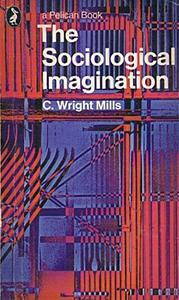Take a photo of a barcode or cover
The Sociological Imagination reads like a manifesto for US sociologists and the intelligentsia. Full of bitter, but succinct and devastating critiques on the then most prevailing trends in sociology, “grand theory†and “abstracted empiricism,†this declaration serves as a moral and ethical footing for those engaged in the field of sociology. Additionally comments on theory and methodology serve as useful tools for students both at the graduate and undergraduate level.
Certain pronouncements, such as the keeping one’s sociological pursuit within the focus of one’s professional and private life is a good antidote for “careerists,†or those who pursue academia not for the uncovering of some greater truth, or useful knowledge for our current political, economic and moral milieu, but are more concerned with prestige, power and self-aggrandizement. My particular copy of the Sociological Imagination has an afterward by noted activist and academic Tod Gitlin who helps to situate the book in the broader context of post-war academia. It is an inspiring book with practical advice on how to pursue scholarship while maintaining a moral footing—not compromising for the “bureaucratic ethos.â€
Certain pronouncements, such as the keeping one’s sociological pursuit within the focus of one’s professional and private life is a good antidote for “careerists,†or those who pursue academia not for the uncovering of some greater truth, or useful knowledge for our current political, economic and moral milieu, but are more concerned with prestige, power and self-aggrandizement. My particular copy of the Sociological Imagination has an afterward by noted activist and academic Tod Gitlin who helps to situate the book in the broader context of post-war academia. It is an inspiring book with practical advice on how to pursue scholarship while maintaining a moral footing—not compromising for the “bureaucratic ethos.â€
really enjoyed this! i'm definitely guilty of being really into my Concepts (thinking mostly about my formal linguistics interests here) and enjoyed mills' challenge to fetishising them. also interesting to map my three months of undergraduate sociology education to the critiques mills makes of over-specific study of social minutiae at the expense of actually understanding anything about our social worlds. the concluding call for sociologists to be actively, openly political made me think of a PhD student who led the seminars for one of my sociology units who i sort of befriended and bumped into a few times at student-staff strike solidarity functions who i looked up to quite a bit. good book, interesting to think about sociology as a craft
informative
reflective
slow-paced
informative
reflective
slow-paced
Second time around with this one, this time as audiobook. I remember this was the intro sociology book at the university during my student years. In hindsight it must have been a bit confusing for students (I read it later), because much of the discussion is so closely related to the particular situation in American sociology in the late 1950s. That said, much of what Mills says remains relevant, even if the terms and the key players have changed. And the Appendix is worth reading every time.
I enjoyed the practicality and delivery style of The Sociological Imagination so much that I even read the chapters in between what we were assigned in class to see if I could get a better picture of what Mills prescribed for a more reasonable solution to the problems of social science understanding. In the end, I did end up liking the chapters assigned more so perhaps it was more an exercise in futility than full-picture comprehension. Especially since it is not until Chapters 9 and 10 that Mills begins to reveal his solutions, which in my opinion were well worth the wait! As someone who is trying to become one of the technocrat policy analysts that is very much a part of the bureaucratization and institutionalization of the human experience, I am very invested in hearing the limitations of this kind of reason but even more so in hearing how to overcome them. It is so often that I encounter criticisms of research or government systems that do not offer any kind of alternative and it does get frustrating to feel entirely conscious of how you can and will be part of the problem but relatively unclear on how to best be part of the solution.
That being said, Mills champions for Reason and Freedom, as capitalized big grand ideas to seek out. As an ordinary man myself, I will take it upon myself to rise up to the ranks of being able to reason about great structures, understand their function within the whole, and have the social intelligence to gain myself institutional relevance, which I would say might be my ultimate goal in life. As he described these big-picture solutions along with individual action, I couldn’t help but feel optimistic about society’s potential progress towards the structure Mills is outlining, even just because I was able to recognize many of the ideas he was describing because of their contemporary relevance in everyday social media dialogues. His worries about “the sphere of consumption being rationalized” is now the modern day ‘the commodification of self care’ and his “systematically regulating his impulses and aspirations…in strict accordance with the ‘rules and regulations of the organization’” has been the backbone of modern conversations about the limits of the concept of ‘professionalism’ and how much your job does not have to be the only driving force in your life decisions. And as beneficial as dialogue itself can be, I believe the corporate landscape has in fact been knuckled into some levels of incremental progress.
Overall, Mills gave me precise language and values to consider when trying to translate personal troubles into public issues and I will do my best to keep my sociological imagination alive whenever reason and freedom permit.
That being said, Mills champions for Reason and Freedom, as capitalized big grand ideas to seek out. As an ordinary man myself, I will take it upon myself to rise up to the ranks of being able to reason about great structures, understand their function within the whole, and have the social intelligence to gain myself institutional relevance, which I would say might be my ultimate goal in life. As he described these big-picture solutions along with individual action, I couldn’t help but feel optimistic about society’s potential progress towards the structure Mills is outlining, even just because I was able to recognize many of the ideas he was describing because of their contemporary relevance in everyday social media dialogues. His worries about “the sphere of consumption being rationalized” is now the modern day ‘the commodification of self care’ and his “systematically regulating his impulses and aspirations…in strict accordance with the ‘rules and regulations of the organization’” has been the backbone of modern conversations about the limits of the concept of ‘professionalism’ and how much your job does not have to be the only driving force in your life decisions. And as beneficial as dialogue itself can be, I believe the corporate landscape has in fact been knuckled into some levels of incremental progress.
Overall, Mills gave me precise language and values to consider when trying to translate personal troubles into public issues and I will do my best to keep my sociological imagination alive whenever reason and freedom permit.
one thing i'll take from this book out of the repetitiveness of hearing it in my daily life is [
University has absorbed my reading and as much as I miss fiction right now, I find no time for it. Finished The sociological imagination by C. Wright Mills a few weeks ago - it was difficult & easy, but good.
1CNeither the life of an individual nor the history of a society can be understood without understanding both. 1D
1CNeither the life of an individual nor the history of a society can be understood without understanding both. 1D
Although I was often frustrated by The Sociological Imagination, I feel that it is a must read for social scientists (and certainly should be read by educators, political scientists, historians, etc.). Mills can be hard to agree with at times, and I regularly had to re-read portions to really understand what was being said. However, this book is an important reminder that we need to act ethically as social scientists--we have to look at the impact of our work (who is it reaching? what are we trying to say?), the formation of our work (has it been biased?), and so forth.
Mills focuses a great deal on the connection between personal troubles and public issues (coming from the idea of the biography within the history--we have to look at how an individual's experiences are effected by their context, and in this case we have to consider that many personal problems stem from larger social issues) and the sociological imagination. Both, in my opinion, are important tools for anyone in an area related to social science.
Mills reminds us that we can't sell out, that we ought to push the envelope and be fearless in our exploration of social issues, and that we must, overall, be mindful and critique ourselves and our work. It is certainly a message worth hearing.
Mills focuses a great deal on the connection between personal troubles and public issues (coming from the idea of the biography within the history--we have to look at how an individual's experiences are effected by their context, and in this case we have to consider that many personal problems stem from larger social issues) and the sociological imagination. Both, in my opinion, are important tools for anyone in an area related to social science.
Mills reminds us that we can't sell out, that we ought to push the envelope and be fearless in our exploration of social issues, and that we must, overall, be mindful and critique ourselves and our work. It is certainly a message worth hearing.
informative







